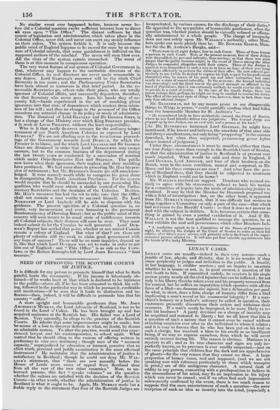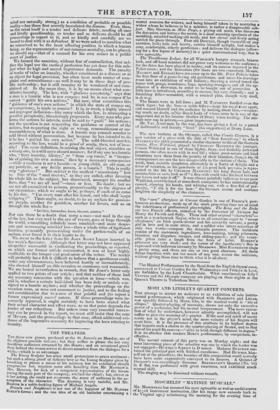LUNACY CASES.
LUNACY cases are usually—indeed in their very nature—such a jumble of law, physic, and divinity, that it is no wonder if they cause perplexity to judges and irritation to the public. A lunatic, in law language, is civiliter mortuus ; and an inquiry to ascertain whether he is insane or not, is, in good earnest, a question of life and death to him. If committed unduly, he receives in his single person pretty nearly all the civil injuries that can be inflicted ; for not only is his liberty thereby taken away and his property removed from his control, but he suffers an imputation which operates with all the force of a libel—no damn= sine irtjuriii, but a defamation per good: In what, in short, does a false charge of insanity differ from a libel implicating a man's raw al or his commercial integrity ? If a mer- chant's honesty or a banker's solvency be called in question, their customers presently discontinue their orders and withdraw their accounts. If a man's sanity be impugned, is lie more likely to re- tain his business ? A party detained on a charge of insanity may be acquitted and restored to liberty ; but we all know that this is a question of such a nature that it cannot even be raised without attaching suspicion ever after to the individual to whom it relates ; and it is easy to foresee that he who has been put on his trial on such a charge, has received a blow to his credit as au intelligent being, if we may so express ourselves, from which he will never entirely recover during life. The reason is obvious. Madness is a mystery to all ; and as its true character and signs are only im- perfectly known, so its presence is ever readily suspected,—just on the same principle that children fear the dark and are apprehensive of ghosts—for the very reason that they cannot see them. A large proportion of lunacy cases, real and supposed, (and we are not speaking now with reference particularly to those which transpire in print,) are of this ambiguous character. A natural dash of oddity in any person, concurring with a predisposition to believe in the unsoundness of his mind, may fix an impression to his injury which can never be erased; and if we often find such impressions subsequently confirmed by the event, there is too much reason to suppose that the mere entertainment of such a question—the mere reception of such an idea as insanity into the mind, (especially a
mind not naturally strong,) as a condition of probable or possible reality—has there first secretly inoculated the disease. Even, then, as the mind itself is a tender and delicate fabric, needing all care and kindly guardianship, so tender and so delicate should be all proceedings in regard to it, and so kindly and carefully are we bound to deal with it as defendant. If we were asked to mention what we conceived to be the most affecting position in which a human being, as the representative of our common mortality, can be placed, we should slv—that of a counsel for his own senses in a public court Of justice.
We hazard the assertion, without fear of contradiction, that nei- ther the legal nor the medical profession has yet done for this sub- ject what its high and sacred importance demands. The paucity of works of value on insanity, whether considered as a disease or as an object for legal provision, has often been made matter of' com- plaint and astonishment—as well it may be in these days of pro- lific authorship ; but it still remains to be wondered at and com- plained of In the mean time, it is by no means clear what con- stitutes insanity. The law, with " glorious uncertainty," says that a man is a lunatic who is non compos; and he is non compos if he cannot " guide his own actions." But now, what constitutes this "guidance of one's own actions" in which the state of compos sun, or competency, is made to consist ? It is, in truth, a highly absurd and improper definition—like many which the law, in attempting a peculiar perspicuity, blunderingly propounds. Every man who per- forms the actions he intends, must be said to "guide" his actions ; but the question is not respecting the guidance or control of the actions, but respecting the right or wrong, reasonableness or un- reasonableness, of what is done. A lunatic may commit murder in cold blood without provocation, but. because he has intended to do it he has " guided his own action." The cold-blooded murder, according to the law, would be a proof of sanity, then, not of insa- nity! The same definition, in missing the real object, stumbles on a wrong one, in a still more absurd manner ; for if any one is a lunatic who, " from insanity, idiotcy," or " from any cause," is " incapa- ble of guiding his own actions," then by a necessary consequence —while a madman is not a lunatic—u young child, an old man, or any paralytic, or any feeble person, is a lunatic ! This is really very "glorious !" But neither is the medical " uncertainty " less so. One of the " mad doctors," as they are called, after devoting his whole life to the subject, has discovered, amongst his smaller facts, that " we are all mad "—more or less. No doubt ; but we arc not all committed to prisons, proportionably to the degrees of our aberration ; which we ought to be, perhaps, if each of us came by his clue. " Use every man after his desert, and who shall 'scape whipping. ?" There ought, no doubt, to be an asylum for passion- ate people, another for gamblers, another for lovers, and so on through the whole list- " Invidus, iracundus, mum, vinosus, amator."
Nor can there be a doubt that many a man—not mad in the eye of the law, but very mad in the eye of reason, goes at large through the world, committing infinitely more mischief—and more despe- rate and unreasoning mischief too—than a whole tribe of legitimate lunatics, peaceably promenading under the garden-walls of an asylum, ever Ibund it in their hearts to do. We recur to the letter from Sir JOHN SCOTT Liutit inserted in last week's Spectator. Although that letter may not have appeared altogether successful in vindicating the proceedings, as reported, on which our former article commented, it was at least highly creditable to the temper and good sense of the writer. The reader will probably have felt it difficult to believe that a gentleman could, under any circumstances, have behaved hastily or inconsiderately, who showed himself on this occasion so courteous and reasonable. We are bound nevertheless to remark, that Sir JOHN'S letter only applied to two points of our article ; and that neither of these had any necessary connexion with the question at issue—which was, and is, whether a certain individual has been duly or unduly con- signed to a lunatic asylum ; and whether the proceedings on the occasion were, or were not consonant to justice, and to the feeling and consideration due to a case of that painful and (to repeat a tbrmer expression) sacred nature. If those proceedings were in- correctly reported, it ought certainly to have been stated what their actual character and elThet were, as on that point depends the justice of our reflections. But unless some very essential inaccu- racy can be proved in the report, we must still insist that the case of 31eNnv, and the proceedings in that case, afford additional evi- dence of the imperative necessity for improving the laws relating to insanity.



























 Previous page
Previous page